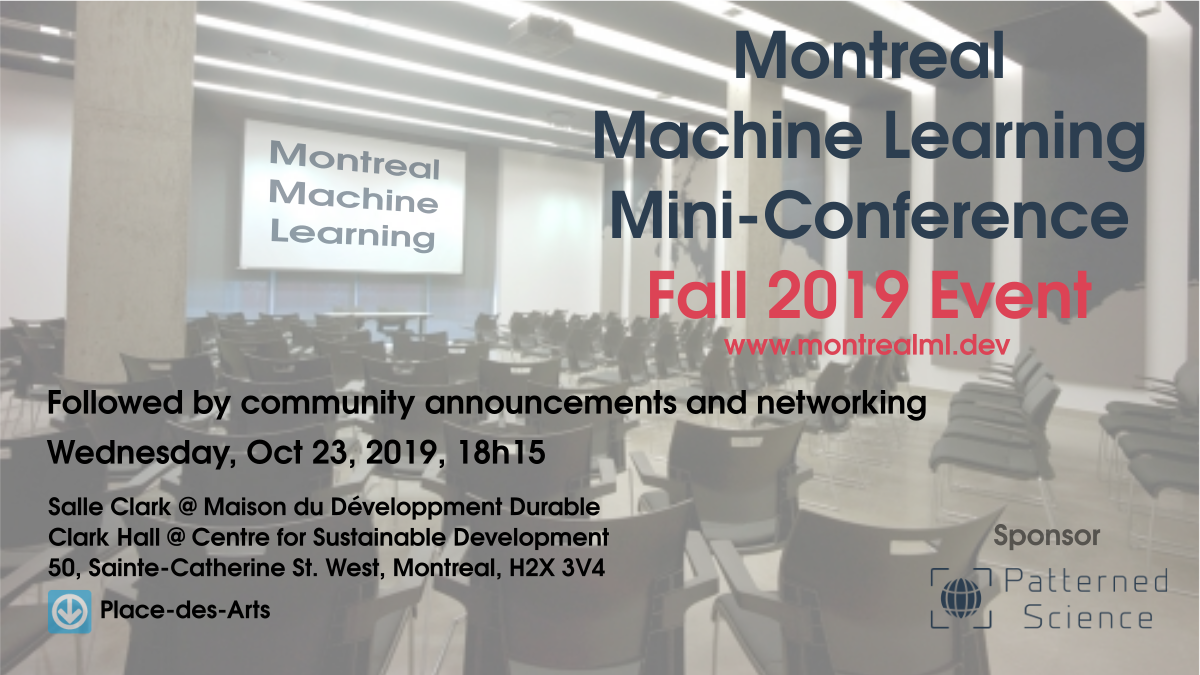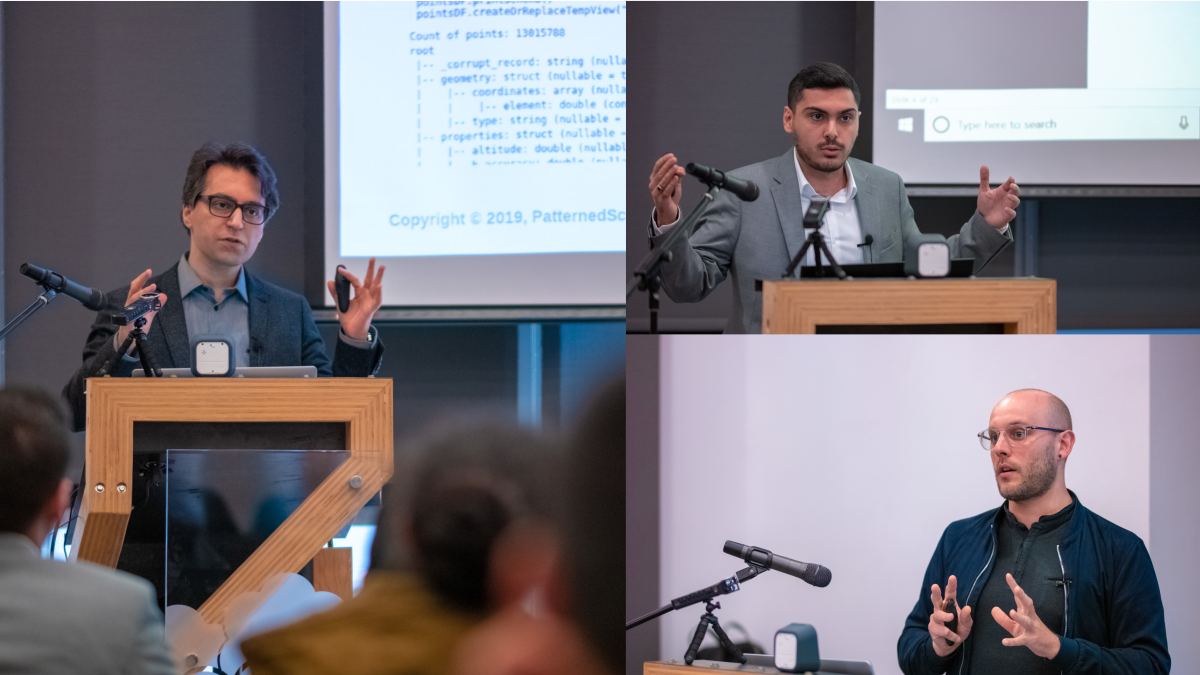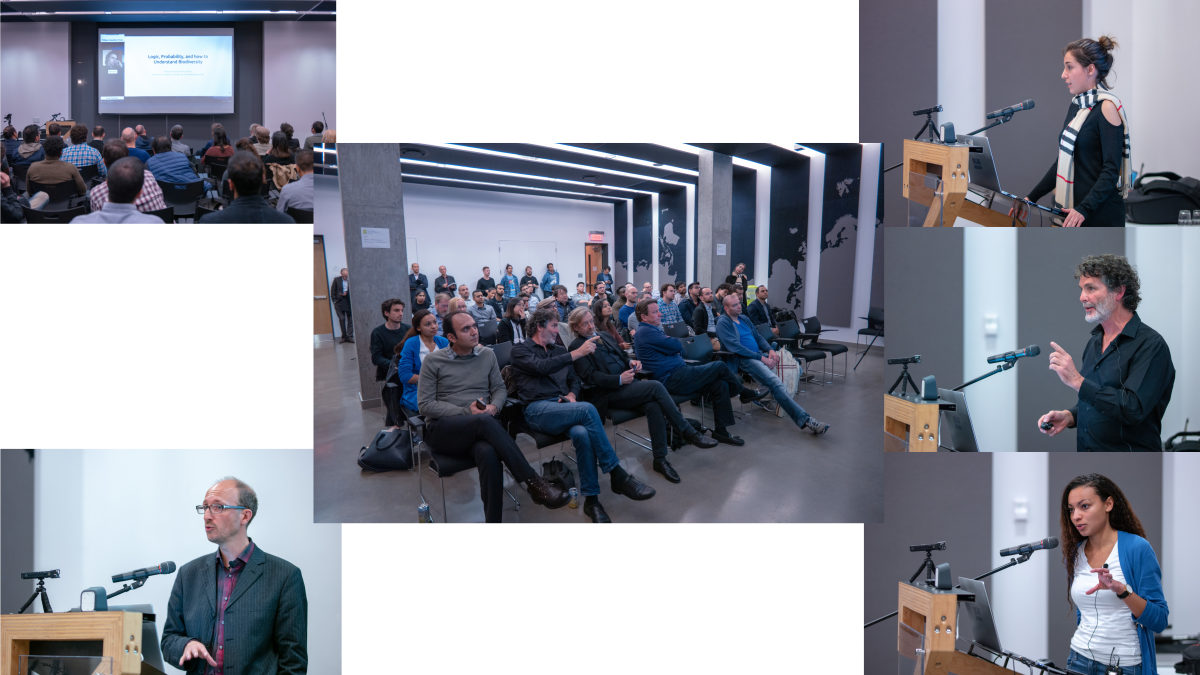Talks
Session #1:
- Forough Karandish, M.Sc., CEO at Walux AI (Title: Real-world Applications of Computer Vision)
- Philippe Desjardins-Proulx, Ph.D., post-doctoral researcher at UdeM (Title: Logic, Probability, and how to understand Biodiversity)
- Naysan Saran, M.Sc., CEO at CANN Forecast (Title: Human Interpretable Machine Learning for decision-making in water management)
Session #2:
- Nikolaj Van Omme, Ph.D., Founder at Funartech (Title: Machine Learning + Operations Research as future of AI)
- Erika Braithwaite, Ph.D., CEO at Precision Analytics (Title: Big data in Big Pharma: what can machine learning and data visualization tell us about health?)
- Michael Slinn, Distinguished Engineer at Micronautics Research Corporation (Title: EmpathyWorks – Towards an Event-Based Simulation/ML Hybrid Platform)
See event page on meetup.com to RSVP and see schedule, address, etc.
Details:
Forough Karandish
Title: Real-world Applications of Computer Vision
Summary: Many industries and companies rely heavily on computer vision technology. Up to this moment, both public and private industries benefit from computer vision algorithms and applications to identify jaywalkers, track customers, collect and analysis human fingerprint and demographic data, to name just a few. This presentation is about computer vision, object detection, and how we can benefit from them in the business.
Bio: Forough Karandish is a computer vision data scientist and CEO at Walux AI. She has a bachelor’s degree in electrical engineering and telecommunications as well as a master’s degree in systems engineering and is specialized in object detection. She’s passionate about computer vision and its application.
Philippe Desjardins-Proulx
Title: Logic, Probability, and how to understand Biodiversity
Summary: Developing good theories to understand biodiversity has proven difficult because of the sheer complexity of the subject. Ecosystems are made of populations composed of unique individuals forming complicated relationships with other species, all of this in a changing environment. Understanding biodiversity involves ideas from ecology, evolutionary biology, genetics, environmental research and even physics. Recent advances in Artificial Intelligence in bridging logic and probability theory offers the opportunity to build rich knowledge bases that combine logic’s ability to represent complex mathematical ideas with probability theory’s ability to model uncertainty. I describe these hybrid languages and explore how they could be used to build a knowledge base for biodiversity.
Bio: Philippe has a mixed background in biology, computer science, and maths. He completed his Ph.D. at the Université de Sherbrooke and is now a post-doctoral researcher at the Université de Montréal, working on Artificial Intelligence applied to disease ecology.
Naysan Saran
Title: Human Interpretable Machine Learning for decision-making in water management
Summary: Aging infrastructure, urbanization trends and climate change are some of the key risks facing water supplies around the world, and present complex challenges to governments and utilities. In the era of Artificial Intelligence, several organizations have been promoting the digitization of water management, based on the premise that smart algorithms can leverage IoT data to change the paradigm for the water industry. However, poor water management decisions can have harmful, long-term consequences on public health, property, and infrastructure; and decision makers are reluctant to trust blackbox algorithms on how to manage their systems. For models to begin making decisions previously entrusted to humans, human interpretable Machine Learning becomes necessary. This talk will present an overview of some of the most promising answers to the question “Why did the model take this decision?” in environmental modelling.
Bio: Naysan Saran is the co-founder and CEO of CANN Forecast (CANN), a startup based in the city of Montreal, that helps municipalities transition towards a proactive approach to water management. The startup was founded by the winning team of the 2016 AquaHacking challenge. CANN is now collaborating with partners such as the Montreal Institute of Learning Algorithms McGill University, as well as municipalities such as of Montreal, Gatineau, Windsor and Halifax. Prior to founding CANN, Naysan worked as a scientific programmer at Environment Canada. She participated in the development and deployment of a machine learning based approach, for the post-processing of numerical weather forecasts. Naysan holds a background in both Computer Engineering and Mathematics, and is passionate about using artificial intelligence to help solve environmental challenges.
Nikolaj Van Omme
Title: Machine Learning + Operations Research as future of AI
Summary: Over the last few years, there has been a booming interest in machine learning in general and deep learning in particular. While this technology is incredible and has opened a box of new possibilities, it has also showed some shortcomings. Geoffrey Hinton famously said “My view is throw it all away and start again”. Could it be that a new hybridization of machine learning and operations research is what he was looking for? Both fields are complementary in the sense that one predicts very well and the other optimizes very well. We will explore this idea in this talk.
Bio: Nikolaj Van Omme holds an MSc in pure mathematics, an MSc in theoretical computer science and a PhD in applied mathematics and industrial engineering. He has been solving complex industrial problems for more than 20 years while working with small, mid sized and big companies (Google, Juniper Networks). In 2017, he cofounded Funartech, a young Montreal startup that specializes in providing creative solutions to industrial problems by combining machine learning and operations research (applied mathematics). This entrepreneurial adventure leads him to work on challenging problems such as climate change or a hybridization of machine learning and operations research that might lead to real intelligence.
Erika Braithwaite, Rhiannon Kamstra, Carlone Scott
Title: Big data in Big Pharma: what can machine learning and data visualization tell us about health?
Summary: Pharmacoepidemiological research questions pertaining to drug usage, drug safety, comparative effective can make use of medical administrative and claims data collected by private and public payers. This type of data, which often contains millions of records, generally includes information on prescription dispensing, hospital procedure, diagnostic codes, and in-patient and out-patient visits. Despite the fact the causal inference is often at the heart of clinical health research, using prediction methods can also lend invaluable insights. In this talk, we will compare traditional statistical models used in pharmacoepidemiology (namely propensity scores), with propensity score methods augmented with machine learning algorithms. We analyzed 30 million records for over 70,000 patients to explore the impact of statins among new users and myocardial infarctions (MI). Novel use of data visualizations will be used to illustrate the use of machine learning approaches in causal inference and health research.
Bios:
Erika Braithwaite is co-founder and CEO of Precision Analytics, a Montreal based health data science start-up specializing in analytics and data visualization in the biopharmaceutical sector.She earned a PhD in epidemiology and biostatistics from McGill University and is currently an adjunct faculty member at McGill University.
Rhiannon Kamstra holds M.Sc. degrees in epidemiology and chemistry. Previously she worked as a healthcare consultant at a large US-based firm conducting research in collaboration with partners in the biotechnology and pharmaceutical industries as well as academia and governmental organizations.
Carlone Scott is a data scientist who holds degrees in applied mathematics. Mr. Scott has worked in industry for ten years, applying mathematical and statistical modelling to many fields including public health. He has also worked in software development teams, building analytical components of applications.
Michael Slinn
Title: EmpathyWorks – Towards an Event-Based Simulation/ML Hybrid Platform
Summary: Machine learning systems have become the dominant form of AI for enterprises due in large part to years of experimentation with combinations of technical approaches. Today’s ML systems are unlike traditional software systems in that algorithms are not used to procedurally specify how systems learn to recognize patterns from input. On the other hand, simulation systems have traditionally been highly procedural, which is good for understanding how a result was obtained, but ‘learning’ is not normally expected. Mike Slinn will discuss a hybrid approach under consideration based on work he started in 2008. The website of EmpathyWorks is at https://www.empathyworks.ai
Bio: Companies that Mike Slinn cofounded, led and advised have been sold to IBM, Otsuka, Microsoft, Yahoo! and NBC Interactive. A recognized software expert in US and European courts, Mike opines on contractual and patent disputes. Mike received an Electronics Engineering degree in 1979 from Carleton University in Ottawa.




